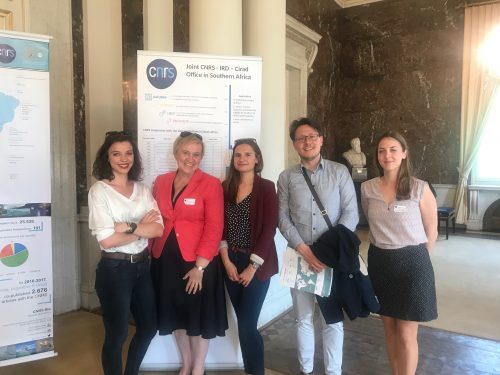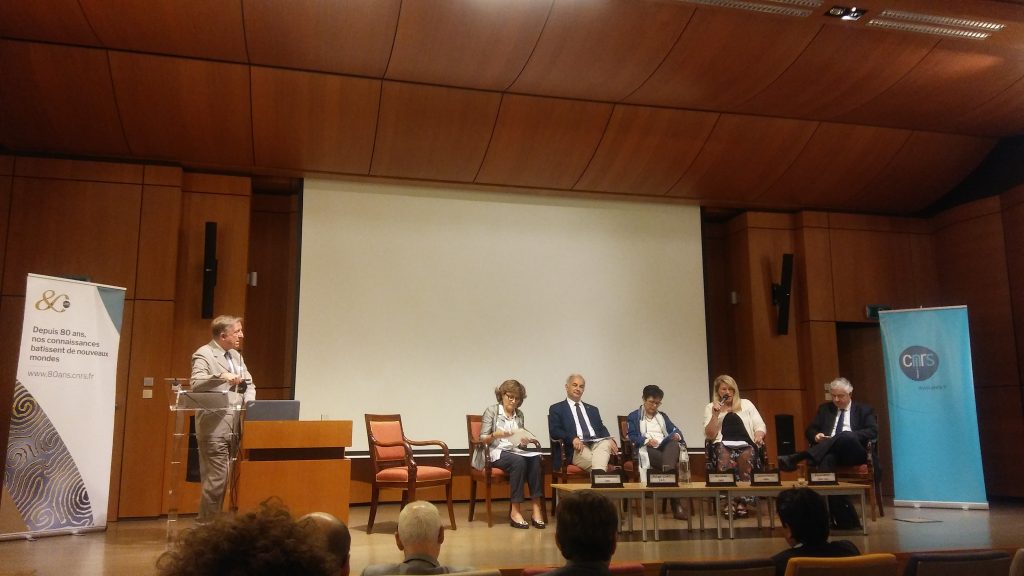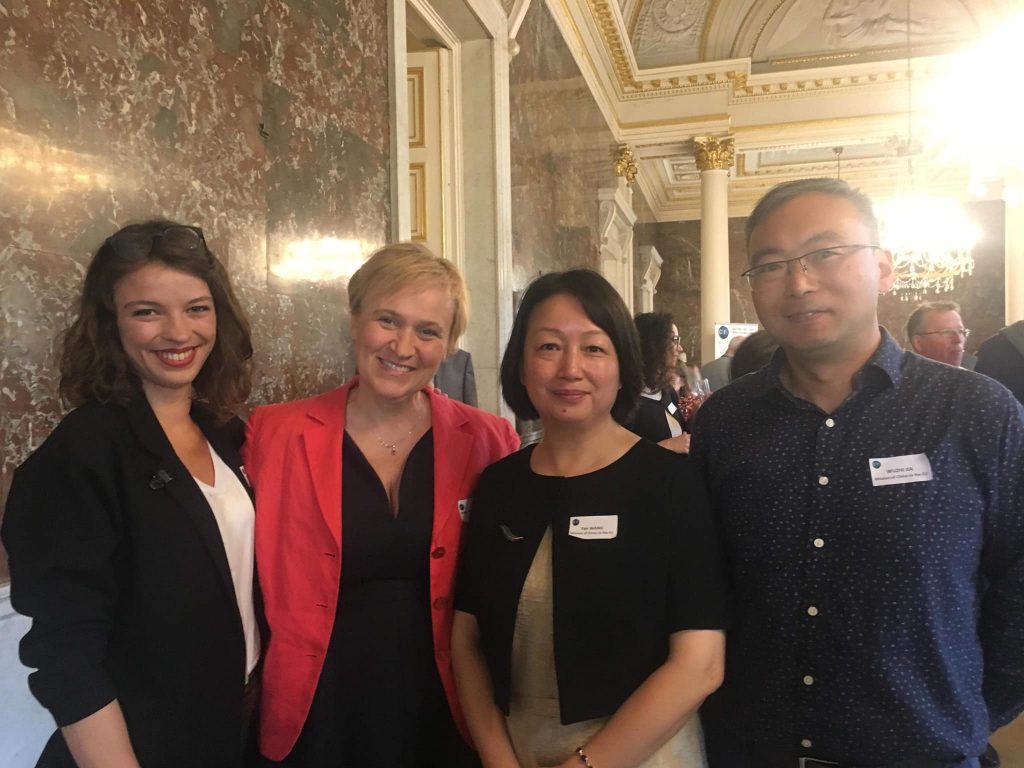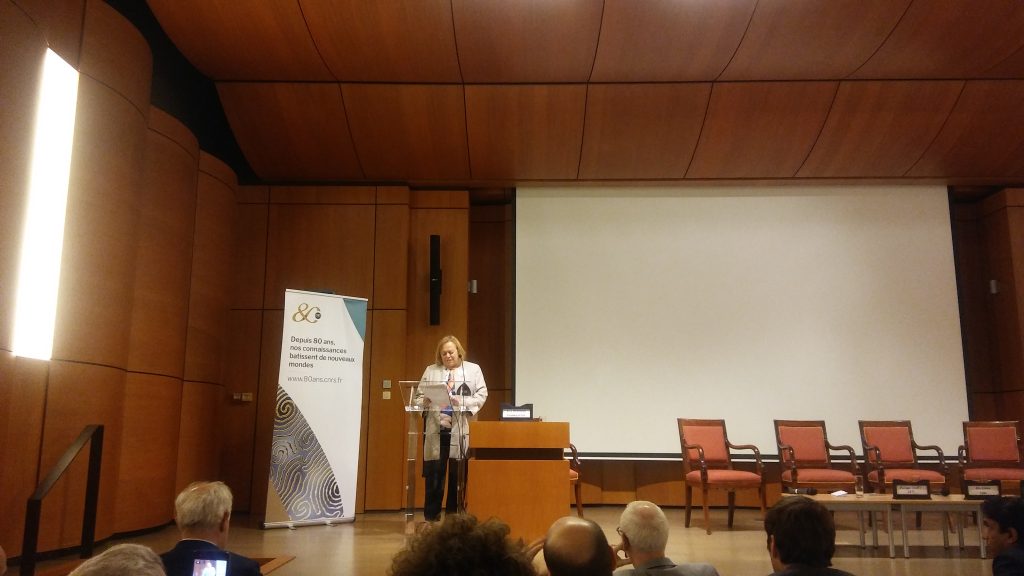On June 19, 2019, the CNRS, celebrating its 80th anniversary, organized a widely promoted conference in Brussels entitled ‘Which scientific diplomacy for Horizon Europe. The contribution of the main players’. Co-organizers of the conference were: The Spanish National Research Council (CSIC), Helmholtz, Institute Pasteur, Thales, Sorbonne Universite and Inalco (University of Languages and Civilization).
The PolSCA office was invited to this event, which took place in the representative rooms of the Royal Academy of Sciences and attracted numerous participants, primarily from the liaison offices that have their headquarters in Brussels, representing the interests of scientists, researchers and innovators. It is worth noting that the decision about opening of such institutions is not only made by EU member states, but also by associated or third countries of EU, for example Japan. The European Register of Transparency, created for all entities wishing to participate in shaping public policies, includes about 1000 research and scientific institutes, think tanks, universities. It should be added that the Polish Science Contact Agency appears in this EU register as well.
The conference encompassed the opening speeches of the president of the CNRS, prof. Antoine Petit, Director General of Research and Innovation, Mr. Jean-Eric Paquet, President of the European Research Council, prof. Jean-Pierre Bourguignon and three thematic panels. The President of CNRS, welcomed all guests and briefly presented the institution he has been managing since 2018. It is worth recalling that the structure of the CNRS changed a few years ago: larger units were established to manage them in easier way. In addition, eight foreign departments of the CNRS are located on all continents: in Brussels, Beijing, Tokyo, Rio de Janeiro, Pretoria, New Delhi, Singapore, Washington. Apart from them, the institution has 75 foreign research laboratories. The annual CNRS budget is 3,4 billion euro.
Mr. Jean-Eric Paquet spoke about the European Comission’s activities related to the new framework program – Horizon Europe (2021-2027). He mentioned the ongoing process of recruitment of chairs and members to the mission boards as well as European Research & Innovations Days which will be held on 24-26 September 2019 in Brussels.
Jean Bourguignon noted that the conditions of carrying out research are changing. The ERC still put emphasis on scientific excellence, but more and more often it also draws attention to the need to ensure efficient communication with the public.
After a short break, the first discussion panel ‘Europe and Asia. What cooperation in a competitive context?’ began. The discussion was attended by: Marie-Cristina Russo from the European Commission, Antoine Mynard from the CNRS, Jennifer Heurley from the Pasteur Institute, Luc le Clavalez from the CNRS, Jean-Francois Huchet from INALCO. The moderator was Patrick Nedellec, responsible for international and European affairs in the CNRS.
Speakers agreed that in Europe-Asia relations we need to get to know each other. Better understanding of our cultures and languages is necessary due to the fact that it strengths and facilitates mutual contacts.
The second panel was devoted to ‘Innovation, an international challenge for Europe. Tools and good practices’. Among participants were: Philippe Valery Thales representing Thales-CNRS in Singapore, Janques Maleval from CNRS, Billy Shapira from Helmholtz in Tel Aviv, Srini Kaveri from the CNRS office in India and Xavier Morise from the CNRS. This panel was moderated by Marylin Fiaschi, head of the Science Business. Dr Kaveri pointed out that innovations should be driven by ‘Jugaad’, the Hindu principle which means acting with the minimum means. This is an optimal technique which has to be taken into consideration by current innovators and researchers.
The last panel ‘European values. The basis for the European Research Area’ concerned normative issues. It was attended by: Elena Dominguez from CSIC, Philippe Cory from IRD and Alia Gana, Laurence Devillers, Pascal Griset from the CNRS. The moderator of the discussion was Pascal Dayez-Burgeon, a historian, specialist in Korea, a former diplomat, who has been heading the CNRS office in Brussels for over 10 years. The most important values that were mentioned were: social trust, openness, solidarity, equality, including gender equality, freedom, human rights and the rule of law. Professor Dominguez said that our task is to protect these values, while prof. Griset stressed that they should be protected by scientific diplomacy, which is ‘about to have a place in the world’.
Last but not least, the conference was summed up by Rosa Menendez, president of The Spanish National Research Council (CSIC). Mrs. Menendez underlined that scientific excellence and mobility of researchers are nothing new – she gave many examples like Nicolaus Copernicus’ staying at the University of Bologna and at the University of Padua or Marie Skłodowska-Curie’s trip to Paris. What is more, she pointed out that Horizon Europe is an excellent opportunity to strengthen and intensify activities related to scientific diplomacy in order to be able to tackle the global challenges facing Europe.
Finally, it is worth considering why French CRNS decided to organize a conference on scientific diplomacy? The position of science and scientists in France is one of the highest in Europe. This is indicated both by the expenditure on science in France itself and the effectiveness in obtaining funds from the European Union. The French, as one of the founders of the European community, can be an active participants in the European research competition. They are ‘scientific masters’ what is reflected in the number of grants obtained from the European Research Council (ERC). The position of scientists in the hierarchy of prestige is also high, emphasis is placed on talking about science and popularizing the achievements of scientists. France perceives science as a tool for promotion, using soft power measures to build research-friendly climate, and through that, strong basis to pursue its political, economic or cultural interests.






